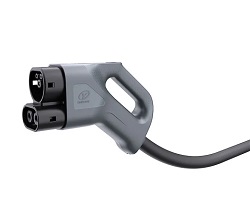𐄀 Technology Connection to Future

As electric vehicles (EVs) become more widespread, an increasing number of application fields are beginning to rely on electric transportation tools, from agriculture to municipal services to the daily use by ordinary consumers. The widespread adoption of EVs is largely thanks to the reduction of "range anxiety," which is all attributable to advanced battery technology that can provide higher energy density and thus extend the driving range of electric vehicles. However, if the charging time is too lengthy, no matter how advanced the battery technology is, its utility will still be limited. Therefore, the adoption of fast-charging technology has become an urgent priority for automakers and component suppliers.
During the charging process, the China car connector is a crucial component. With the increase in electric vehicle battery capacity, connectors must support up to 1000 volts of direct current and handle up to 500 kilowatts (kW) of power, while also being compatible with alternating current sources. Additionally, charging connectors must comply with international safety standards such as IEC 62196 and SAE J1772 to ensure that EVs can charge quickly and safely.
To address this issue, the Combined Charging System (CCS) emerged. The CCS charging port is designed to support both AC and DC connections simultaneously. When the EV is parked at home or in a parking lot, AC charging is more convenient; while in shops, service areas, or dedicated charging stations, DC fast charging is the more efficient choice.
CCS charging connectors have different standards worldwide. In North America, CCS connectors use the SAE J1772 standard and are called Type 1; in Europe, CCS connectors use the IEC 62196 standard and are called Type 2. The interface between EVs and Electric Vehicle Supply Equipment (EVSE) follows ISO/IEC 15118 and DIN SPEC 70121 standards.
To ensure the safety and efficiency of the EV charging system, the mechanical and electrical design of CCS connectors has been standardized. However, engineers must also take into account several key factors when choosing and designing these devices:
IP Protection Levels: These levels include protection when the plug is inserted, without a cover when unplugged, and with a cover when unplugged. For example, an IP20-rated uncovered plug only prevents objects larger than 12 mm from entering and is not waterproof. Common IP ratings are IP54, IP55, and IP65, which effectively prevent dust and water ingress, making them suitable for outdoor environments.
Operating Temperature Range: CCS charging connectors typically operate within a temperature range of -30°C to +50°C, with some models extending from -55°C to +105°C to adapt to extreme climate conditions.
Temperature Measurement Components: To ensure safety during charging, AC contacts usually use PTC (Positive Temperature Coefficient) devices, while DC contacts use Pt1000 sensors. Designers should ensure that the specifications meet CCS standards and avoid using Pt100 sensors with lower sensitivity.
To support fast-charging technology for EVs, Yonggui offers CCS2 charging connectors that comply with IEC 62196-1/-3 standards. This connector has passed international certifications such as TÜV Mark, CE, and CB, ensuring its safety and efficiency. Yonggui's CCS2 charging connector is suitable for DC charging stations in the EU, providing an efficient, intelligent, and safe charging solution for EVs, especially in scenarios requiring high-power quick charging.
As the battery capacity of EVs continues to increase and the demand for long-distance driving rises, both AC and DC fast-charging systems have become indispensable for EVs. AC charging is suitable for EVs with shorter driving ranges, while higher-power DC fast charging can charge the battery to 80% in just a few minutes, meeting the needs of long-distance driving. With CCS connectors, designers can achieve safe, intelligent, and efficient fast-charging systems for EVs, meeting the growing market demand. Yonggui’s CCS2 charging connectors not only comply with international standards but also provide a convenient and safe solution, driving EV charging technology towards higher efficiency and intelligence.